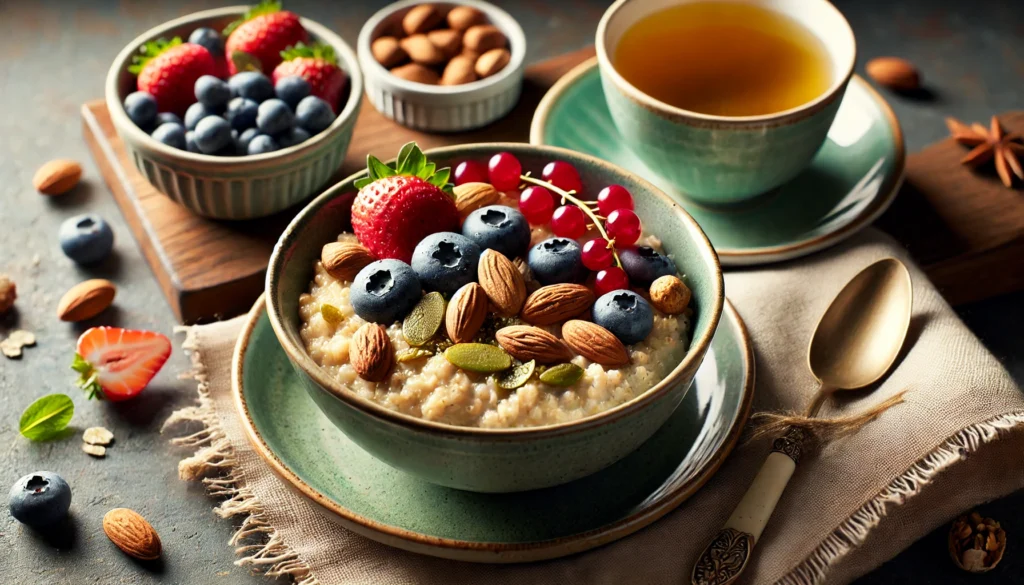Dementia, a term that encompasses various neurodegenerative diseases like Alzheimer’s, affects millions worldwide. While no diet can cure dementia, emerging research suggests that certain foods may help manage symptoms and improve quality of life. To understand this, it is essential to explore how nutrition intersects with cognitive health and the historical context of dietary influences on brain function.
You may also like: Memory-Boosting Foods You Should Try Today
The Role of Nutrition in Cognitive Health
The brain requires a continuous supply of nutrients to function optimally. Nutrients such as omega-3 fatty acids, antioxidants, and certain vitamins are known to support brain health. Omega-3s, found in fatty fish, play a crucial role in building brain cell membranes, while antioxidants help protect the brain from oxidative stress and inflammation. Additionally, B vitamins, particularly B6, B12, and folic acid, are important for maintaining healthy nerve cells and red blood cells, which are essential for cognitive processes.
A diet lacking in these essential nutrients can lead to impaired brain function and increased vulnerability to neurodegenerative diseases. Furthermore, minerals such as zinc and magnesium are also integral to cognitive performance, influencing neurotransmitter functions and synaptic plasticity. Ensuring a balanced intake of these nutrients can help maintain brain health and potentially slow cognitive decline.
Historical Context of Diet and Brain Health
Historically, diets rich in fruits, vegetables, whole grains, and healthy fats have been associated with lower risks of cognitive decline. The Mediterranean diet, in particular, has gained attention for its potential brain-protective effects. This diet emphasizes plant-based foods, lean proteins, and healthy fats, echoing dietary patterns traditionally linked with longevity and reduced dementia risk.
The traditional Japanese diet, rich in fish, rice, and seaweed, has also been noted for its cognitive benefits, potentially contributing to the lower incidence of dementia observed in Japanese populations. Moreover, indigenous diets, often high in natural, unprocessed foods, provide insights into the potential benefits of whole-food-based nutrition for cognitive health. These historical dietary patterns emphasize the importance of natural, unprocessed foods in supporting brain health, offering valuable lessons for modern dietary practices.
Modern Dietary Patterns and Cognitive Function
In recent decades, the Western diet, characterized by high consumption of processed foods, sugars, and unhealthy fats, has been linked to an increased risk of cognitive decline. This shift towards convenience foods has led to nutritional deficiencies that can adversely affect brain health. Emerging research suggests that adhering to traditional dietary patterns, such as the Mediterranean or DASH diets, can mitigate these risks.
The growing interest in plant-based diets also highlights the potential cognitive benefits of reducing meat consumption and increasing the intake of plant-derived nutrients. These dietary shifts can help reduce inflammation and oxidative stress, two key contributors to neurodegenerative diseases. Understanding these modern dietary influences provides a framework for developing effective nutritional strategies for dementia care.
Foods That Support Brain Health
Selecting the right foods can make a significant difference in supporting cognitive function and overall brain health. By focusing on nutrient-dense foods, caregivers can help provide the necessary support for their loved ones with dementia. Here, we explore various food groups known for their brain-boosting properties.
Omega-3 Rich Foods
Omega-3 fatty acids, particularly EPA and DHA, are vital for maintaining brain structure and function. These essential fats are abundant in fish such as salmon, mackerel, and sardines. For caregivers, incorporating these fish into meals can be a powerful way to support the cognitive health of dementia sufferers.
For those who prefer plant-based options, flaxseeds, chia seeds, and walnuts are excellent sources of alpha-linolenic acid (ALA), a type of omega-3 that the body can convert into EPA and DHA. Additionally, algae-based supplements offer a vegan-friendly alternative to fish oils, providing essential omega-3s without animal products. Understanding the different sources of omega-3s allows caregivers to tailor dietary choices according to personal preferences and dietary restrictions.
Antioxidant-Rich Fruits and Vegetables
Colorful fruits and vegetables are packed with antioxidants, which combat oxidative stress—a contributor to brain aging and cognitive decline. Berries, in particular, are high in flavonoids, compounds shown to improve brain function. Including a variety of berries, leafy greens, and cruciferous vegetables in the diet can offer protective benefits.
Dark leafy greens such as spinach, kale, and collard greens are rich in vitamins C and E, which are potent antioxidants that help protect the brain from damage. Additionally, brightly colored vegetables like carrots, bell peppers, and sweet potatoes provide carotenoids, which have been linked to improved cognitive performance. By diversifying the range of fruits and vegetables, caregivers can maximize the antioxidant intake for their loved ones.
Foods High in Vitamin E
Vitamin E is a potent antioxidant that may help protect neurons from damage. Foods rich in vitamin E include nuts, seeds, and leafy greens. Regular consumption of these foods can provide the necessary nutrients to support brain health.
Sunflower seeds, almonds, and hazelnuts are particularly high in vitamin E, offering an easy and delicious way to enhance dietary antioxidant levels. Incorporating these nuts and seeds into snacks or meals can be a simple yet effective strategy to boost vitamin E intake. Moreover, oils such as sunflower and safflower oil are excellent sources of vitamin E, providing versatility in cooking and meal preparation.

Whole Grains for Steady Energy
Whole grains such as brown rice, quinoa, and whole wheat bread provide a consistent energy source for the brain. They are rich in fiber and help regulate blood sugar levels, which is crucial for maintaining concentration and cognitive function.
Oats, barley, and bulgur are additional whole grain options that offer a variety of textures and flavors to meals while supporting sustained energy release. The slow digestion of whole grains ensures a steady supply of glucose to the brain, preventing energy dips that can affect mood and cognitive clarity. By incorporating a range of whole grains, caregivers can promote stable energy levels and support overall brain health.
Eating Habits and Dementia
Establishing positive eating habits is as crucial as selecting the right foods when caring for someone with dementia. Thoughtful meal planning and attentive caregiving can significantly enhance the dining experience and nutritional intake for dementia sufferers. Here are some strategies to consider.
Establishing a Routine
Creating a consistent eating routine can help reduce confusion and anxiety for dementia sufferers. Regular meal times, familiar foods, and a calm dining environment can make mealtime a more enjoyable experience.
Establishing a daily schedule that includes set times for breakfast, lunch, and dinner can provide a sense of stability and predictability. Additionally, involving the individual in meal preparation or setting the table can foster a sense of participation and control. Simple, uncluttered table settings and minimizing distractions during meals can further enhance focus and enjoyment.
Encouraging Hydration
Proper hydration is often overlooked but is essential for cognitive function. Dehydration can exacerbate confusion and cognitive impairment. Encourage regular water intake by offering water-rich foods like fruits and soups and providing fluids throughout the day.
Providing a variety of beverages, such as herbal teas, infused water, or diluted fruit juices, can make hydration more appealing. Caregivers can also create visual reminders or use apps to prompt regular drinking intervals. Monitoring urine color and frequency can help assess hydration levels, guiding adjustments as needed to ensure adequate fluid intake.
Managing Appetite Changes
Dementia can affect appetite and eating habits, leading to nutritional deficiencies. Caregivers should monitor weight and nutritional intake, adjusting meals to ensure a balanced diet. Smaller, more frequent meals may be more manageable and appealing.
Exploring different textures and flavors can stimulate interest in food, while presenting meals attractively can enhance appetite. Offering finger foods or nutrient-dense snacks, like cheese cubes or yogurt, can be beneficial when traditional meals are challenging. Collaborating with a dietitian can provide personalized strategies to address specific dietary needs and preferences.
The Alzheimer’s Diet: MIND Your Health
The MIND (Mediterranean-DASH Intervention for Neurodegenerative Delay) diet is a hybrid of the Mediterranean and DASH diets, specifically designed to reduce Alzheimer’s disease risk. It emphasizes brain-healthy foods such as green leafy vegetables, berries, nuts, and fish.
The Science Behind the MIND Diet
Research indicates that the MIND diet may slow cognitive decline and improve brain health. Its focus on specific food groups targets nutrients known to combat inflammation and oxidative stress, key factors in neurodegeneration.
The MIND diet recommends consuming at least three servings of whole grains, a salad, and another vegetable daily, along with a glass of wine if appropriate. It also suggests including nuts, beans, and poultry regularly, while limiting red meat, butter, cheese, and sweets. This structured approach provides a clear framework for caregivers to support brain health through dietary choices.
Practical Implementation of the MIND Diet
Incorporating the MIND diet into daily routines requires thoughtful planning and preparation. Simple swaps, like replacing butter with olive oil or choosing fish over red meat, can align meals with MIND diet principles. Caregivers can experiment with MIND-friendly recipes and meal plans to simplify the adoption of this dietary pattern.
Collaborating with healthcare professionals can offer additional support and resources, ensuring the diet is tailored to the individual’s needs and preferences. By gradually integrating these dietary changes, caregivers can create sustainable habits that support long-term cognitive health.
Success Stories and Testimonials
Numerous caregivers and individuals have reported positive outcomes from following the MIND diet. These success stories often highlight improved cognitive clarity, mood stability, and overall quality of life. Sharing experiences and tips with other caregivers can foster a supportive community and inspire continued commitment to brain-healthy eating.
Hearing firsthand accounts of dietary transformations can motivate caregivers to persist with dietary interventions, even when challenges arise. By celebrating small victories and progress, caregivers can maintain momentum and encourage their loved ones to embrace the MIND diet.

Foods That May Help Remove Plaque from the Brain
Certain foods and compounds have shown promise in reducing amyloid plaques, a hallmark of Alzheimer’s disease. While more research is needed, incorporating these foods into the diet may offer potential cognitive benefits.
Turmeric and Curcumin
Turmeric, a spice containing the active compound curcumin, has anti-inflammatory and antioxidant properties. Some studies suggest that curcumin may help reduce amyloid plaques in the brain, a hallmark of Alzheimer’s disease.
Incorporating turmeric into meals, such as curries or golden milk, can be a flavorful way to reap its potential benefits. Curcumin supplements are also available, but it’s essential to consult with healthcare providers before adding them to the regimen. Pairing turmeric with black pepper can enhance curcumin absorption, maximizing its therapeutic effects.
Green Tea
Rich in polyphenols, green tea may support brain health by reducing the buildup of harmful proteins. Regular consumption of green tea can be a simple yet effective addition to a brain-healthy diet.
Beyond its cognitive benefits, green tea can also provide a calming ritual, offering a moment of relaxation in daily routines. Experimenting with different varieties, like matcha or sencha, can add variety and enjoyment. Sweetening with honey or lemon can enhance the flavor while maintaining its healthful properties.
Dark Chocolate
Dark chocolate, particularly varieties with high cocoa content, contains flavonoids that may enhance brain function and protect against cognitive decline. However, moderation is key to avoid excessive sugar intake.
Choosing chocolate with at least 70% cocoa can optimize flavonoid intake while minimizing added sugars. Incorporating small portions of dark chocolate into snacks or desserts can satisfy sweet cravings while supporting brain health. Exploring recipes that combine dark chocolate with nuts or fruits can create delicious, nutrient-rich treats.
Future Implications and Emerging Research
The field of dementia and nutrition is rapidly evolving, with ongoing research exploring the potential of various dietary interventions. As new findings emerge, caregivers can adapt and refine dietary strategies to better support their loved ones.
The Role of Personalized Nutrition
Personalized nutrition, which tailors dietary recommendations based on individual genetic, metabolic, and lifestyle factors, may hold promise for optimizing brain health in dementia sufferers. As our understanding of the gut-brain axis and nutrigenomics advances, personalized approaches could become integral to dementia care.
Utilizing tools like genetic testing and microbiome analysis can provide insights into specific nutritional needs and sensitivities. Collaborating with nutritionists and healthcare professionals can help design tailored dietary plans that address unique requirements. By embracing personalized nutrition, caregivers can enhance the effectiveness of dietary interventions and support optimal cognitive outcomes.
Technological Innovations in Nutrition
Technological advancements are revolutionizing the way we approach nutrition and dementia care. Apps and wearable devices can track dietary intake, monitor hydration levels, and provide reminders for meal times, enhancing adherence to dietary plans.
Virtual reality and artificial intelligence are also emerging as tools to educate caregivers and dementia sufferers about nutrition and cognitive health. These technologies offer interactive and engaging ways to learn about brain-supportive diets, empowering caregivers with knowledge and skills.
Collaborative Research and Global Initiatives
Collaborative research efforts and global initiatives are crucial for advancing our understanding of nutrition and dementia. International studies and partnerships can facilitate the sharing of data and insights, leading to more comprehensive and culturally relevant dietary recommendations.
Participating in clinical trials and research studies can also contribute to the growing body of knowledge in this field. By staying informed and engaged with emerging research, caregivers can remain at the forefront of innovative dietary strategies that support dementia care.

Conclusion
Navigating the complexities of dementia care is no small feat, but understanding the impact of nutrition on cognitive health can empower caregivers to make informed dietary choices. By focusing on brain-supportive foods and mindful eating habits, caregivers can contribute significantly to the well-being of those with dementia. As research continues to unfold, embracing a balanced, nutrient-rich diet remains a cornerstone of effective dementia care.
Caregivers play a vital role in shaping the nutritional landscape for dementia sufferers, and by doing so, they can help foster a better quality of life for their loved ones. Through education, collaboration, and commitment, caregivers can make a meaningful difference in the lives of those they care for, ensuring that nutrition remains a key component of dementia management and support.
Further Reading:
Foods That May Prevent Dementia
The best foods for reducing dementia risk
Best Foods for Dementia Patients to Eat
Important Note: The information contained in this article is for general informational purposes only, and should not be construed as health or medical advice, nor is it intended to diagnose, prevent, treat, or cure any disease or health condition. Before embarking on any diet, fitness regimen, or program of nutritional supplementation, it is advisable to consult your healthcare professional in order to determine its safety and probable efficacy in terms of your individual state of health.
Regarding Nutritional Supplements Or Other Non-Prescription Health Products: If any nutritional supplements or other non-prescription health products are mentioned in the foregoing article, any claims or statements made about them have not been evaluated by the U.S. Food and Drug Administration, and such nutritional supplements or other health products are not intended to diagnose, treat, cure, or prevent any disease.


